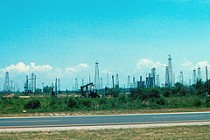Oil reserve diminishing?
Experts say that spare oil reserves in places like Saudi Arabia are dwindling faster than expected.

 Concerns about oil reserves have been raised by energy industry experts at the Reuters Energy Summit that began yesterday, Monday June 13.
Concerns about oil reserves have been raised by energy industry experts at the Reuters Energy Summit that began yesterday, Monday June 13.
Peter Csoregh, fund manager at Robeco Natural Resource equities fund, said that oil prices could surge up to $147 a barrel due to the “unquenchable thirst” of developing counties and China in particular.
He warned that this trend will not only increase prices but will mean that countries will have to dip into their oil reserves: "Once spare capacity falls below 2 million bpd [barrels per day], which will be sometime next year, then we will see substantial spikes in the oil price from time to time."
"Can they [China] double from here, can they triple from here? Sure they can. Is there enough oil or copper in the world to allow them to do that? No", he added.
China’s industrial output in May jumped 13.3 per cent from a year earlier, government data showed on Tuesday, with the largest demand coming from China’s aviation industry.
Meng Fanqiu, chief executive of China Aviation Oil (CAO) said: "China is the second-biggest market for jet fuel after the US but demand is 6 times higher there, so there is a lot of potential."
China’s demand for natural resources has been putting pressure on oil manufactures, experts said.
The Saudi newspaper Al-Hayat reported that Saudi Arabia would boost output to 10 million bpd in July to meet the growing demand.
But Mr. Csoregh remains doubtful: "There's an inherent bias, especially in the Middle East and Saudi Arabia, to overstate their spare capacity", he said.
This comes after the Organization of Petroleum Exporting Countries (OPEC) announced on Friday June 10, that an oil gap was “looming” at the end of the year as they fail to reach its estimated output. This lead to a decline in oil prices after Saudi Arabia began offering more oil to customers to ease worries about supply.
Experts also warned that volatility of the Middle East could spike up oil prices even more. They mentioned Libya’s civil war, which has disrupted oil production since February, an equivalent of about 1.3 million bdp.
The International Energy Agency (IEA) estimated that demand for OPEC oil will average 29.95 million bpd in the second half of the year. This is a an average rise of 1.2 million bdp a month from last year’s figures.
Elsewhere, US crude oil inventories fell last week by 1 million barrels and continued the trend on lower imports and as higher margins, creating an a major oil price rise in the country.
The OPEC report estimates that the world is expected to use 1.38 million bpd of oil, more this year than in 2010. Experts say this is already obsolete, and this figure is bound to grow.
Image: Roger4336 | Flickr

